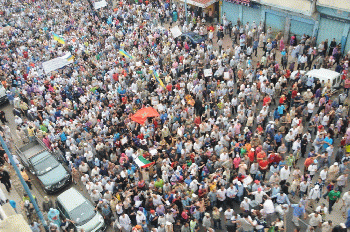From Smirking Chimp
Ten years ago, a hawker in Tunisia set himself on fire, which spurred people along the entire Mediterranean Sea -- from Morocco to Spain -- to rise up in revolt. They took to their squares indignant at the terrible conditions in which they had to make their lives.
Little of their agenda has been advanced in the past decade. Governments of the southern European states have one by one betrayed the aspirations of the people; the most dramatic such failure was of the Syriza government in Greece, which won a mandate against austerity and then surrendered before the troika (the European Central Bank, the European Commission, and the International Monetary Fund) in 2015.
Uprisings in northern Africa ended with the return of the generals (as in Egypt), the destruction of states (as in Libya), and the assertion of the Arab monarchies (from Morocco to Saudi Arabia).
A decade later, U.S. President Donald Trump carved the obituary on the tombstone of that "Arab Spring" rebellion when he used the immensity of U.S. power to strengthen U.S. allies -- such as the Arab monarchies and Israel -- to the detriment of the people of the region.
What remains of the Arab Spring is a distant memory of the crowds in Cairo's Tahrir Square; a better image of the present is that of the monarchs of Morocco and the United Arab Emirates (UAE) kissing up to Israel to please the United States.
Danger in the Eastern Mediterranean
In the Arabic-speaking countries, two sets of conflicts emerged as the people in the public plazas shook up the politics in their countries. The first was between Iran and the Gulf Arab monarchies (led by Saudi Arabia and the UAE). This had a catastrophic impact on Lebanon and on Syria. The second was the conflict between the countries with affinity to the Muslim Brotherhood (Qatar and Turkey) and the Gulf Arab monarchies. Both conflicts, inflamed by Israel, continue to threaten regional wars.
It was under pressure from Saudi Arabia and Israel that the United States concocted a "nuclear threat" from Iran and drove an agenda that resulted in the 2015 Iran deal. Several of the Iranian nuclear scientists were, meanwhile, assassinated from 2010 to the present; Iran blames Israel and the United States for these killings. Sanctions and threats of military intervention have now almost become normal. The gravity of this conflict is undiminished and will not decrease even if U.S. Presidential-elect Joe Biden returns his country to the framework of the nuclear deal.
More sinister has been the deepening conflict against Qatar, but especially Turkey. In 2017, Saudi Arabia and its allies began a blockade against Qatar; the animosity is so great that Saudi Arabia planned to cut the landmass around Qatar and convert it into an island.
Both the Gulf Arabs and the Europeans were disturbed by Turkey's influence over the new governments across North Africa. They colluded to overthrow the Muslim Brotherhood government in Egypt in 2013 and to prosecute a war in Libya against Turkish influence over the UN-recognized government in Tripoli.
The discovery of massive natural gas fields in the eastern Mediterranean in 2009 changed the equation of old rivalries in the area, particularly between Israel and its neighbors, and between Turkey and Greece over Cyprus. In the past decade, alliances across the Mediterranean have cemented around control over these gas fields. Maps with conflicting claims have been published, and near-military conflicts have been hard to avert. Turkish arming of troops in Libya gave both French (June 2020) and German (November 2020) ships the opportunity to try to board Turkish vessels. The European Union threatened to put harsh sanctions against Turkey at its summit on December 10-11, but then decided to put off any decision on sanctions until the next meeting in March 2021.
(Note: You can view every article as one long page if you sign up as an Advocate Member, or higher).






